Hope, Humanity & Housing: Life on Sacramento streets
Reporter Vicki Gonzalez spent the past year on this series as a recipient of the 2018 California Fellowship with the USC Annenberg Center for Health Journalism.
Other stories in this series include:
Hope, Humanity & Housing: Terminally ill and living on Sacramento streets
Hope, Humanity & Housing: 69-year-old gets second chance after living on Sacramento streets
Hope, Humanity & Housing: Sacramento program aims to get people off streets, into homes
Hope, Humanity & Housing: Sacramento Mercy Pedalers deliver simple solutions
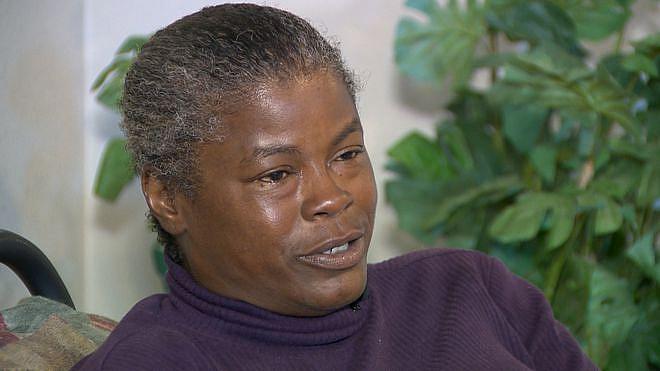
Chana Smith
(Photo Credit: KCRA 3)
SACRAMENTO, Calif. (KCRA) —
Her story is different. Her story is the same.
Chana Smith was one of more than 3,000 people living on the streets of Sacramento. She worked in customer service for more than 20 years, including Verizon Wireless for eight years before losing her job.
"When I worked at Verizon, two of my co-workers said they had the best seat in the house listening to me work,” Smith said. "But, it's just, it's a feeling. The customer knows that you really truly care about them.”
In 2013, Smith got a new roommate. He was a friend who was going through a divorce and needed a place to stay. Smith said he was struggling and drank a lot, a habit, she admits, she enabled.
"And then, he introduced me to crystal (meth), and all of a sudden I lost the desire to work," Smith said.
After Smith lost her job, she lived off her 401(k) retirement savings. But eventually, she ended up on the streets.
"I'm a creature of habit," she said. "When I lost my job, I didn’t have a routine anymore -- and my routine was solid."
For five years, Smith lived on little means, moving from campsite to campsite.
“There are some things that we can do as homeless people to stay industrious and not fall into a rut because I know guys that go to work every day that are homeless and they will work on time every day," Smith said.
In 2014, she contracted a staph infection while living at Camp Pollock in the Woodlake area.
"I mean it was really bad,” Smith said. "Just to get up to walk was impossible. The staph infection, my leg, look I'm diabetic, I thought they'd have to cut my leg off."
Last year, a Sacramento County park ranger connected Smith with an opportunity to change her life. What happened next took hard work.
Smith’s story is different but the same as many people who live on the streets.
Hope, Humanity & Housing is a series that follows people living on the streets of Sacramento County. Their stories aim to put a face on a complex condition with many stigmas: homelessness.
From death to life, the stories from Sacramento County streets are lined with hope.
You can read and watch by scrolling down or picking the chapter of your choice. Smith’s story continues in the epilogue.
Dying on the streets
Pancreatic cancer took Jamie Murphy’s life on Aug. 14, 2018. But not without leaving behind a legacy of empathy -- that the most vulnerable should die with dignity and respect.
Murphy was a passionate advocate for Joshua’s House, which is slated to become the first homeless hospice center in the West Coast and one of only a handful in the country.
The 46-year-old gave an emotional testimony during a Sacramento City Council meeting taking up Joshua’s House. In May, councilmembers voted unanimously for the homeless hospice center to move forward.
"These kinds of things show who we are as the heart and soul of this country and as a society,” founder Marlene von Friederichs-Fitzwater said. “And we need to take better care of people."
Murphy's terminal diagnosis ultimately left him unable to work, rotating from motel to motel. He lived off a little over $900 a month in supplemental security income.
His SSI covered roughly half the motel bills, leaving Murphy to scrounge for the rest. He said his local church would often help cover costs.
"(Motels) only allow you 14 days to stay," Murphy explained. "But, they've been allowing me 28 days."
Murphy's step-mother said she couldn't help her son and had to love him from a distance.
Murphy lived with his fiancée for more than 11 years; a relationship that ultimately came to an end due to his debilitating condition.
"She saw me start to deteriorate, so she couldn't -- she was having a hard time,” Murphy said. “So, we parted ways. I didn't want to do that to her anymore."
Going through chemotherapy and with a vulnerable immune system, Murphy went searching for an affordable, sanitary solution. He called Joshua’s House, incorrectly thinking the homeless hospice facility was open.
Joshua’s House is scheduled to open in early 2019. The 20-bed facility is partnering with all Sacramento-based hospitals to provide hospice care to those terminally ill on the streets.
Joshua’s House rendering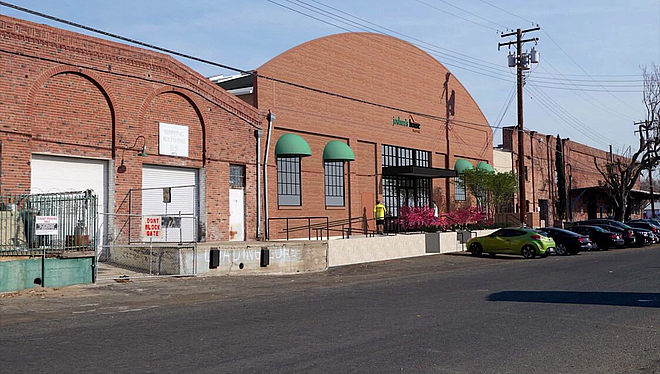
"I met newly diagnosed cancer patients who were homeless, and that was shocking to me,” Fitzwater said. “I had not thought about that -- that someone could be going through cancer and be homeless. And as a cancer survivor myself, I just, I couldn't understand how you go through that."
Fitzwater, a retired UC Davis Medical School professor, was propelled to spring into action when confronted with the issue personally.
"I lost my grandson in 2014 who died on the streets,” Fitzwater said. “He had been homeless much of his adult life due to addictions -- but he was this very loving compassionate wonderful young man."
Although Joshua’s House couldn’t yet help Murphy, Fitzwater could. She stepped in financially, covering Murphy’s motel costs until she could find him a permanent home for his final month.
Fitzwater’s effort paid off. For the last month of Murphy’s life, he struck the housing lottery in the shape of a fifth wheel provided by Sacramento Self-Help Housing.
"When I am in heaven, I will put good words in for everybody and stuff," Murphy said. "Get them off the streets. Give them the same chance I'm getting. That's what I want for people."
As for Murphy, the 46-year-old was able to make amends with his family and longtime love before passing away.
Fitzwater said a portion of Murphy’s ashes will stay at Joshua’s House, as well as a memorial in honor of his legacy.
"Homeless people should have the opportunity to have hospice care and be cared for,” Fitzwater said. “To have a way to die with dignity and love as we do."
Elderly and homeless
Irene Sotelo is savoring a new start in the shape of a freshly boiling artichoke in her kitchen.
"I haven't had one in a long time,” she said. “I've seen them as high as $5 each!"
The 69-year-old’s past handful of years have been a departure from decades of financial security.
"I had a nice apartment, one bedroom in Carmichael. I've always been in Carmichael. Had my two little dogs. I had Comcast," Sotelo said. "It was five years ago when a doctor botched the surgery."
A saga of complications from a failed intestinal surgery ended with Sotelo becoming the victim of theft.
“I was evicted from my apartment because my in-home supportive care worker stole my money. And, I couldn't make it up fast enough,” Sotelo said. "I was going to sleep in my car. I had no place to go. And, it's not as easy for me to live in my car as it would be for other people because I have to change my bandage four or five times a day."
The 69-year-old found herself at a homeless shelter for the first time in her life.
"It was like going to a different planet -- it was really, really hard. I would walk down the street wishing I was dead," Sotelo said. “You get to be my age, and nobody wants to give you a job. We're too old to be in this situation. We're not young anymore."
Sotelo is now part of a vulnerable population benefiting from a new solution in Sacramento County.
Irene Sotelo (Photo Credit: KCRA 3)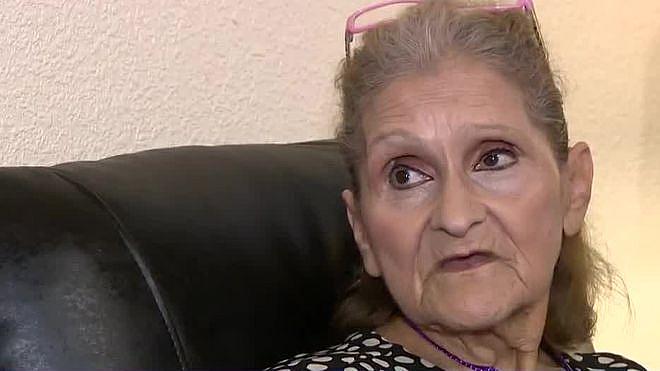
The county approved funding for a partnership with Sacramento Self-Help Housing’s scattered-site rehousing program. The county-funded program targets individuals with the highest barriers to finding affordable housing – such as people with prior evictions, addictions and disabilities.
The program launched in April, renting homes where several clients live as roommates and have 24-7 supervision. Clients get one-on-one support from case workers who help them get their life back on track. As long as they are making healthy strides toward their individual goals, they can stay in the rehousing program.
"These folks are not paying any rent, they don't pay any fees. So that any income they have, they're able to save during the time that they're with us," said Jeremy Baird with Sacramento Self-Help Housing. "They just simply need to be able -- and willing -- to give it a try. To work on these issues that are contributing to their homelessness."
Sacramento Self-Help Housing is currently renting 10 homes with 50 beds and is still ramping up. The goal is to lease a total of 15 homes with 75 beds.
"Some people are a little hesitant to let us rent their rooms because they're thinking negative connotations with homeless people,” said Richelle Cullen with Sacramento Self-Help Housing. “But, they're so respectful. These houses are cleaner than my house."
According to the nonprofit, in just under six months, the rehousing program served a total of 80 clients, 47 of which are still active in the program.
Of the 33 who are no longer in the program, 20 have successfully transitioned into permanent housing, Baird said. The 13 others had various reasons for leaving the program, including hospitalization, incarceration, voluntary exit or asked to leave the program for not complying with the rules.
“In my experience, this is an unusually high rate of success, especially in light of the fact that we aren’t ‘cherry-picking’ clients,” Baird said. “In fact, more like the opposite is true. We’re actively looking for the most vulnerable people with the highest barriers to housing.”
As for Sotelo, she has newfound optimism to regain financial independence.
“Oh, it’s a lifesaver. I couldn't have been on the street,” Sotelo said. "Not being on the street -- and also having hope of getting a job.”
Pedaling hope, connections
A Sacramento nonprofit is taking a new, simplistic approach for those living on the streets.
It starts with a cup of coffee.
Mercy Pedalers began one year ago. In that time the nonprofit has grown into more than 50 volunteers.
The nonprofit’s founder, Sister Libby Fernandez, has spent the past quarter century helping those surviving with very little in Sacramento.
Sister Libby led Loaves and Fishes before taking leave and starting Mercy Pedalers.
"To really bring love and care and welcoming the stranger," Sister Libby said. “It's really about a one-on-one relationship and building trust, care and saying 'Hey, how else can I help you today? I'm here for you.'"
This is how it works: Sister Libby pedals a trike full of donated necessities and information on pilgrimages, estimating she serves around 100 a day.
"Deodorant, lotion, toothbrushes, toothpaste, hand wipes, even combs, bar soaps,” Sister Libby said. "And then of course the resources -- where can they go tonight."
Volunteers with Mercy Pedalers (Photo Credit: KCRA)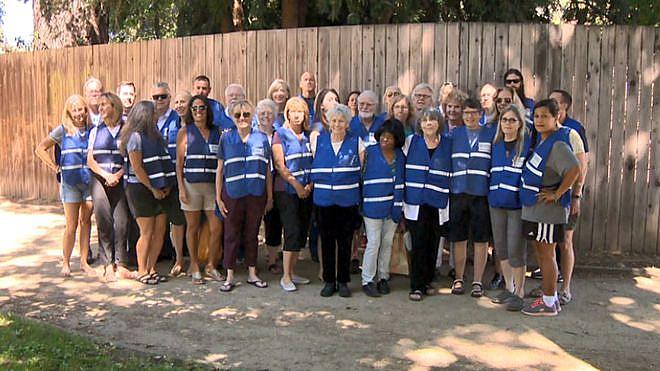
But, the coffee is integral.
"Part of the communication is to offer what people would like -- to start the dialogue. ‘Would you like coffee? Would you like cream and sugar in it?’ While I am stirring it, I am having a conversation,” Sister Libby said.
Sister Libby said one day they may be asking for soap and shampoo, and the next, it could be how to get into a shelter.
"It's steps. But you got to start somewhere," Sister Libby said.
In the nonprofit’s first year, what began as a solo operation has blossomed into an army of compassion.
"I love it because it started as, you know, just myself and a few followers, and now we have 50 mercy peddlers," Sister Libby said. "Everything's donated, from the coffee, to the hygiene items, to the nutritional bars. So we try to keep our operations very minimal. It's all volunteers and all donations."
Volunteers range from ages 20 to 82. They comprise college students, full-time workers and retirees.
"I think they know that I enjoy it just as much as they do. It's the truth,” volunteer Kathleen Sanders, 82, said. “I think it keeps me alive. You know, without purpose why do you get up in the morning?"
Each volunteer selects their own neighborhood -- from Cesar Chavez, McKinley, and Roosevelt parks to Burrito Dave on Broadway.
"I feel like these people out here are just like any one of us,” volunteer Diana Jorgensen said. “It could happen to anybody at any time."
Sister Libby said there is nothing like this in California. She is hoping to branch Mercy Pedalers throughout the state and beyond.
"It comes from their heart. It doesn't come from something they have to do,” Jonathon Britton, who benefits from the service, said. "They come out with their little baskets and hand it out. It makes my day."
Solutions ahead?
The city of Sacramento is trying a new approach to find housing for the most chronic individuals living on the streets.
“Three of our guests, at one time, had 120 years combined total,” said Ana Darzins with Volunteers of America.
A triage shelter opened in December 2017 in north Sacramento. As of August, the shelter has served more than 400 individuals -- 135 of which, or roughly a third, have been placed in permanent housing.
"Some of our most chronically homeless -- mentally ill, physically disabled, addicted individuals," Darzins said. "I see a lot of our friends that are 65 to, I think, our oldest is 88 years old. And, almost everyone in the building has a disability."
The VOA runs the triage shelter, which provides wrap-around social, mental, medical and VA services onsite in a rotating basis.
“For the first time we're allowing pets, we're allowing camping equipment and all the things that have prevented people from wanting to come in the shelter,” Mayor Darrell Steinberg said. "You actually say to people, 'Well, you know you can't use drugs onsite of course, or drink onsite, but we're going to take you as you are.'"
Cherie Bloom, 48, was living in an encampment on the American River levee for three years. A hit-and-run accident that nearly took her life led her to the triage shelter’s services.
"I tell people every day, 'Do you realize the opportunities you have here?'” Bloom said. "I don't want to be stuck out there forever. I don't want to be that one. I don't want to be that person."
The triage shelter is part of the city’s Whole Person Care pilot program, which is partially funded by a $64 million federal match grant. It kicked off this year and is still developing.
"I've got a Social Security card, which I haven't had in over 15 years. I go to a doctor. And, I am signed up for housing,” said Ms. Paula, who has been experiencing homelessness for 20 years. "I've been very happy. I owe them a lot."
Cherie Bloom talks with volunteer at the Sacramento Winter Triage Center (Photo Credit: KCRA 3)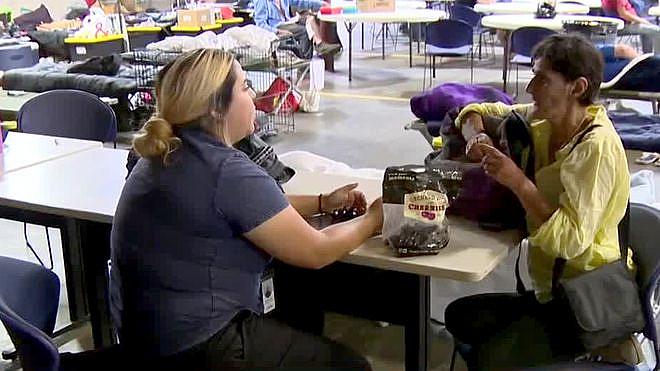
The city said since Whole Person Care began, it has enrolled nearly 650 people. About 40 percent of them are now housed, either in shelters or in permanent housing, and 65 percent of them identified medical needs so complex that they require in-home care, palliative care or hospice care.
"From the bottom of my heart, I do appreciate that,” Bloom said. "Because you guys got me back to where I was."
Epilogue
With the ranger's help, Smith was connected with a county housing program -- but she had to follow the rules.
"One of the main reasons people want to remain homeless is because they have their own set of rules out there," she said.
Smith became part of Sacramento Self-Help Housing’s scattered-site rehousing program. She got one-on-one support from a caseworker, who helped her get her life back on track.
According to the program, Smith is able to stay as long as she makes healthy strides toward her goals.
“I don't want to just lay around to get a paycheck because I really can teach a class on soft skills,” Smith said. "If I get somebody to do my resume and I could probably go back to work."
Smith said she could teach a class on customer service.
“I probably talked to a over a million people over my career and I always leave a lasting impression on them. It’s just a gift,” she explained.
For now, Smith is focused on her new home as she looks to the future.
"You know what, I just love this house,” she said. “This house has good energy in it."
About the series
Hope, Humanity & Housing is an in-depth look at new solutions to the complicated and growing disparities of those struggling to find affordable housing in Sacramento.
[This story was originally published and broadcast by KCRA 3.]

